Analysis of Unilever's International Business and HRM Strategies
VerifiedAdded on 2022/07/08
|19
|6292
|59
Report
AI Summary
This report provides a comprehensive analysis of Unilever's human resource management (HRM) practices within the context of its international business operations. The report begins by evaluating Unilever's core HRM practices, focusing on people management, HRM integration, and performance management, while also identifying factors impacting global HRM and common HRM problems. The report then delves into Unilever's organizational behavior, specifically its culture of performance, and evaluates its organizational behavior policies. Furthermore, the report examines Unilever's approach to international HRM, including financial challenges, global performance management, managing a diversified workforce, conflict management, expatriate management, and training and development. The report concludes with recommendations for improving HRM practices within Unilever, offering insights into areas such as employee motivation, transparency, and talent identification. The report is structured to provide a detailed overview of Unilever's strategic HRM and its impact on the company's global performance.
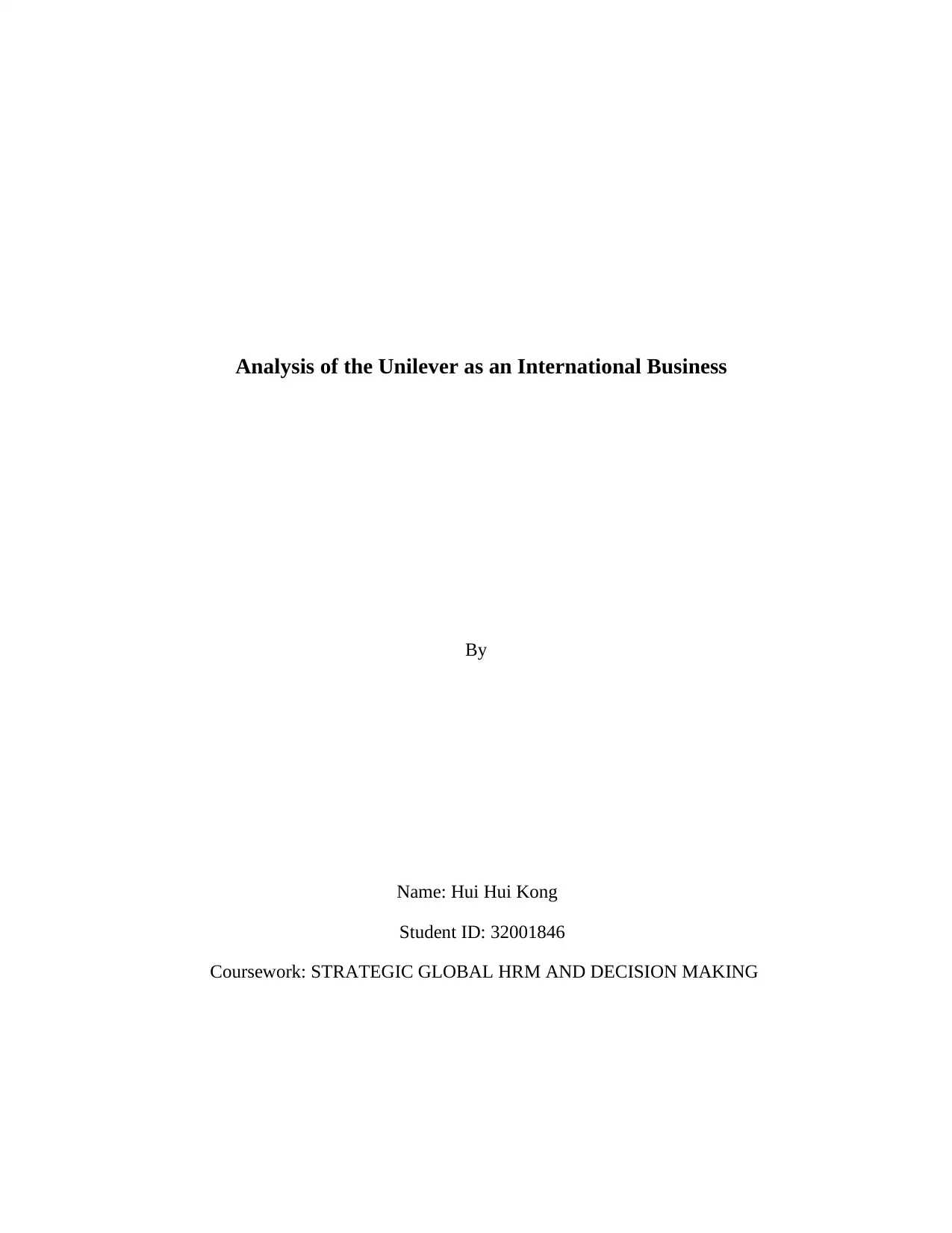
Analysis of the Unilever as an International Business
By
Name: Hui Hui Kong
Student ID: 32001846
Coursework: STRATEGIC GLOBAL HRM AND DECISION MAKING
By
Name: Hui Hui Kong
Student ID: 32001846
Coursework: STRATEGIC GLOBAL HRM AND DECISION MAKING
Paraphrase This Document
Need a fresh take? Get an instant paraphrase of this document with our AI Paraphraser
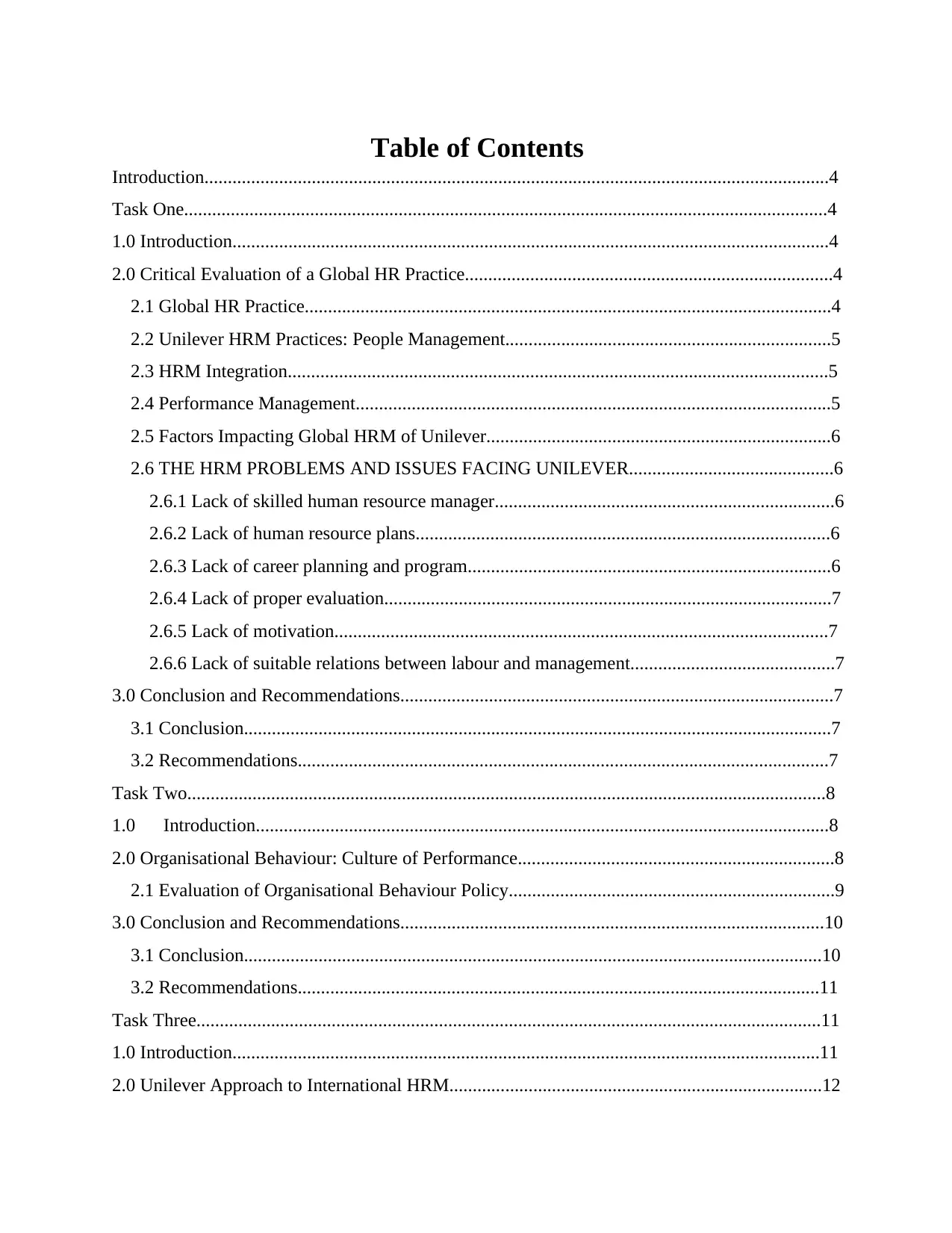
Table of Contents
Introduction......................................................................................................................................4
Task One..........................................................................................................................................4
1.0 Introduction................................................................................................................................4
2.0 Critical Evaluation of a Global HR Practice...............................................................................4
2.1 Global HR Practice.................................................................................................................4
2.2 Unilever HRM Practices: People Management......................................................................5
2.3 HRM Integration....................................................................................................................5
2.4 Performance Management......................................................................................................5
2.5 Factors Impacting Global HRM of Unilever..........................................................................6
2.6 THE HRM PROBLEMS AND ISSUES FACING UNILEVER............................................6
2.6.1 Lack of skilled human resource manager.........................................................................6
2.6.2 Lack of human resource plans.........................................................................................6
2.6.3 Lack of career planning and program..............................................................................6
2.6.4 Lack of proper evaluation................................................................................................7
2.6.5 Lack of motivation..........................................................................................................7
2.6.6 Lack of suitable relations between labour and management............................................7
3.0 Conclusion and Recommendations.............................................................................................7
3.1 Conclusion..............................................................................................................................7
3.2 Recommendations..................................................................................................................7
Task Two.........................................................................................................................................8
1.0 Introduction...........................................................................................................................8
2.0 Organisational Behaviour: Culture of Performance....................................................................8
2.1 Evaluation of Organisational Behaviour Policy......................................................................9
3.0 Conclusion and Recommendations...........................................................................................10
3.1 Conclusion............................................................................................................................10
3.2 Recommendations................................................................................................................11
Task Three......................................................................................................................................11
1.0 Introduction..............................................................................................................................11
2.0 Unilever Approach to International HRM................................................................................12
Introduction......................................................................................................................................4
Task One..........................................................................................................................................4
1.0 Introduction................................................................................................................................4
2.0 Critical Evaluation of a Global HR Practice...............................................................................4
2.1 Global HR Practice.................................................................................................................4
2.2 Unilever HRM Practices: People Management......................................................................5
2.3 HRM Integration....................................................................................................................5
2.4 Performance Management......................................................................................................5
2.5 Factors Impacting Global HRM of Unilever..........................................................................6
2.6 THE HRM PROBLEMS AND ISSUES FACING UNILEVER............................................6
2.6.1 Lack of skilled human resource manager.........................................................................6
2.6.2 Lack of human resource plans.........................................................................................6
2.6.3 Lack of career planning and program..............................................................................6
2.6.4 Lack of proper evaluation................................................................................................7
2.6.5 Lack of motivation..........................................................................................................7
2.6.6 Lack of suitable relations between labour and management............................................7
3.0 Conclusion and Recommendations.............................................................................................7
3.1 Conclusion..............................................................................................................................7
3.2 Recommendations..................................................................................................................7
Task Two.........................................................................................................................................8
1.0 Introduction...........................................................................................................................8
2.0 Organisational Behaviour: Culture of Performance....................................................................8
2.1 Evaluation of Organisational Behaviour Policy......................................................................9
3.0 Conclusion and Recommendations...........................................................................................10
3.1 Conclusion............................................................................................................................10
3.2 Recommendations................................................................................................................11
Task Three......................................................................................................................................11
1.0 Introduction..............................................................................................................................11
2.0 Unilever Approach to International HRM................................................................................12
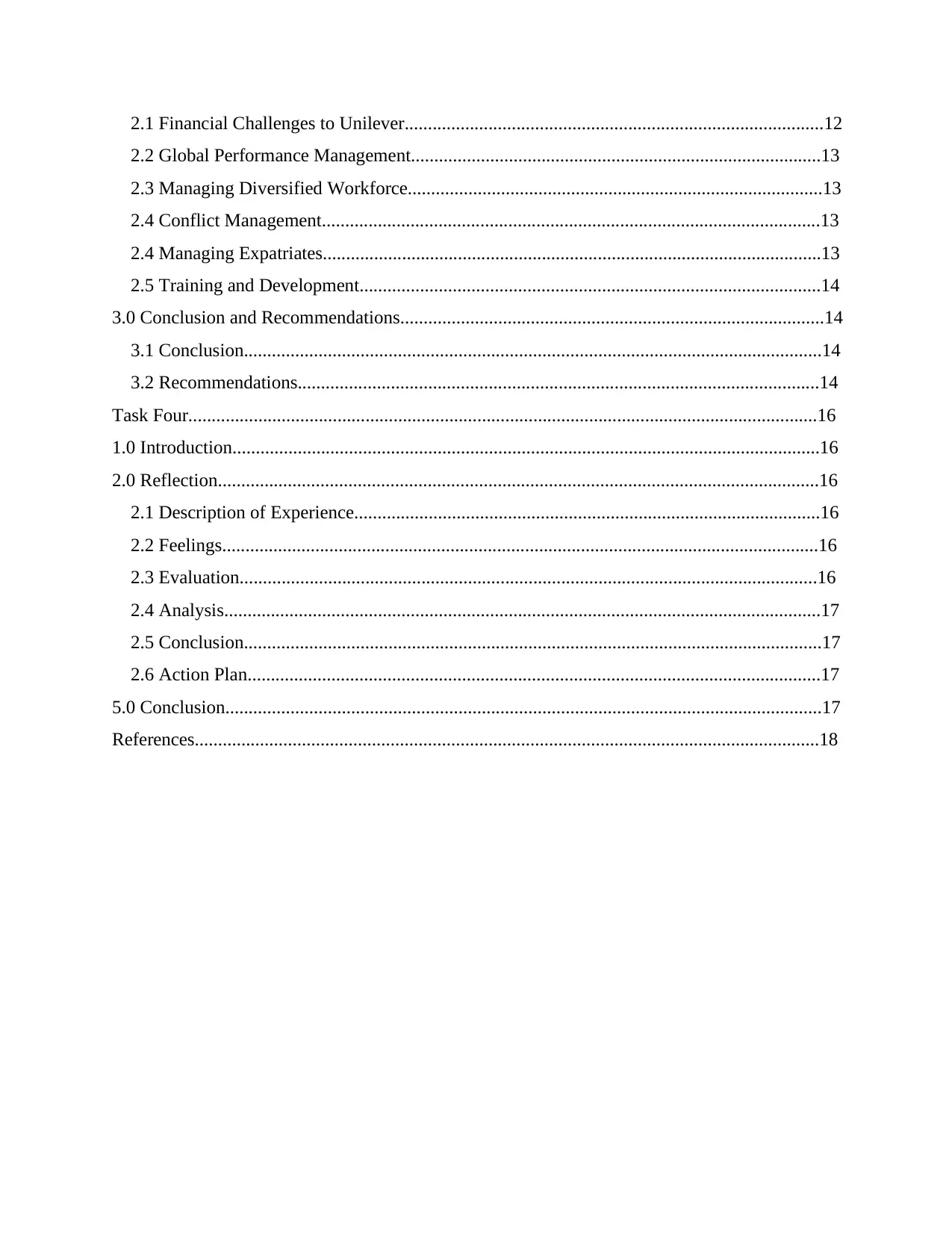
2.1 Financial Challenges to Unilever..........................................................................................12
2.2 Global Performance Management........................................................................................13
2.3 Managing Diversified Workforce.........................................................................................13
2.4 Conflict Management...........................................................................................................13
2.4 Managing Expatriates...........................................................................................................13
2.5 Training and Development...................................................................................................14
3.0 Conclusion and Recommendations...........................................................................................14
3.1 Conclusion............................................................................................................................14
3.2 Recommendations................................................................................................................14
Task Four.......................................................................................................................................16
1.0 Introduction..............................................................................................................................16
2.0 Reflection.................................................................................................................................16
2.1 Description of Experience....................................................................................................16
2.2 Feelings................................................................................................................................16
2.3 Evaluation............................................................................................................................16
2.4 Analysis................................................................................................................................17
2.5 Conclusion............................................................................................................................17
2.6 Action Plan...........................................................................................................................17
5.0 Conclusion................................................................................................................................17
References......................................................................................................................................18
2.2 Global Performance Management........................................................................................13
2.3 Managing Diversified Workforce.........................................................................................13
2.4 Conflict Management...........................................................................................................13
2.4 Managing Expatriates...........................................................................................................13
2.5 Training and Development...................................................................................................14
3.0 Conclusion and Recommendations...........................................................................................14
3.1 Conclusion............................................................................................................................14
3.2 Recommendations................................................................................................................14
Task Four.......................................................................................................................................16
1.0 Introduction..............................................................................................................................16
2.0 Reflection.................................................................................................................................16
2.1 Description of Experience....................................................................................................16
2.2 Feelings................................................................................................................................16
2.3 Evaluation............................................................................................................................16
2.4 Analysis................................................................................................................................17
2.5 Conclusion............................................................................................................................17
2.6 Action Plan...........................................................................................................................17
5.0 Conclusion................................................................................................................................17
References......................................................................................................................................18
⊘ This is a preview!⊘
Do you want full access?
Subscribe today to unlock all pages.

Trusted by 1+ million students worldwide
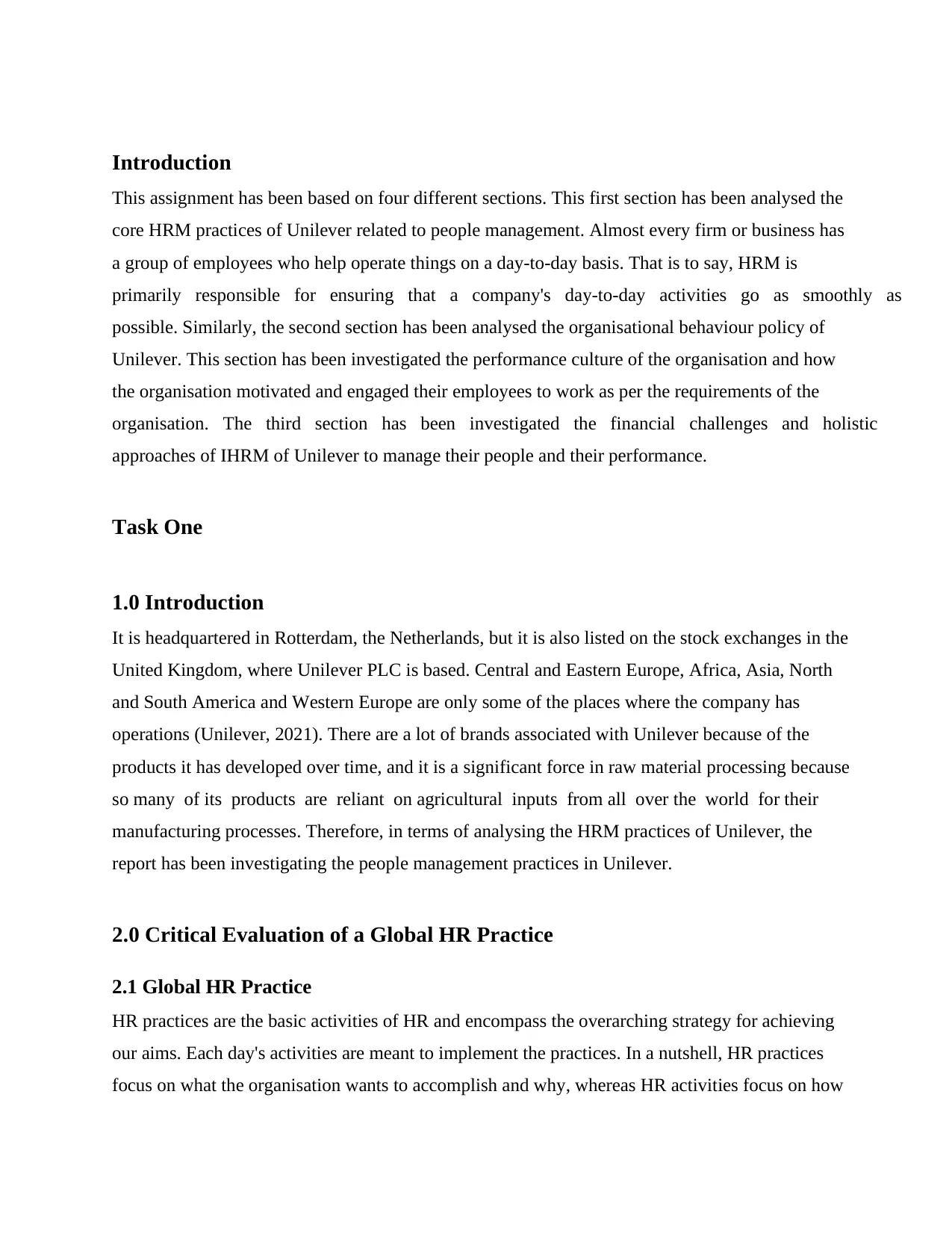
Introduction
This assignment has been based on four different sections. This first section has been analysed the
core HRM practices of Unilever related to people management. Almost every firm or business has
a group of employees who help operate things on a day-to-day basis. That is to say, HRM is
primarily responsible for ensuring that a company's day-to-day activities go as smoothly as
possible. Similarly, the second section has been analysed the organisational behaviour policy of
Unilever. This section has been investigated the performance culture of the organisation and how
the organisation motivated and engaged their employees to work as per the requirements of the
organisation. The third section has been investigated the financial challenges and holistic
approaches of IHRM of Unilever to manage their people and their performance.
Task One
1.0 Introduction
It is headquartered in Rotterdam, the Netherlands, but it is also listed on the stock exchanges in the
United Kingdom, where Unilever PLC is based. Central and Eastern Europe, Africa, Asia, North
and South America and Western Europe are only some of the places where the company has
operations (Unilever, 2021). There are a lot of brands associated with Unilever because of the
products it has developed over time, and it is a significant force in raw material processing because
so many of its products are reliant on agricultural inputs from all over the world for their
manufacturing processes. Therefore, in terms of analysing the HRM practices of Unilever, the
report has been investigating the people management practices in Unilever.
2.0 Critical Evaluation of a Global HR Practice
2.1 Global HR Practice
HR practices are the basic activities of HR and encompass the overarching strategy for achieving
our aims. Each day's activities are meant to implement the practices. In a nutshell, HR practices
focus on what the organisation wants to accomplish and why, whereas HR activities focus on how
This assignment has been based on four different sections. This first section has been analysed the
core HRM practices of Unilever related to people management. Almost every firm or business has
a group of employees who help operate things on a day-to-day basis. That is to say, HRM is
primarily responsible for ensuring that a company's day-to-day activities go as smoothly as
possible. Similarly, the second section has been analysed the organisational behaviour policy of
Unilever. This section has been investigated the performance culture of the organisation and how
the organisation motivated and engaged their employees to work as per the requirements of the
organisation. The third section has been investigated the financial challenges and holistic
approaches of IHRM of Unilever to manage their people and their performance.
Task One
1.0 Introduction
It is headquartered in Rotterdam, the Netherlands, but it is also listed on the stock exchanges in the
United Kingdom, where Unilever PLC is based. Central and Eastern Europe, Africa, Asia, North
and South America and Western Europe are only some of the places where the company has
operations (Unilever, 2021). There are a lot of brands associated with Unilever because of the
products it has developed over time, and it is a significant force in raw material processing because
so many of its products are reliant on agricultural inputs from all over the world for their
manufacturing processes. Therefore, in terms of analysing the HRM practices of Unilever, the
report has been investigating the people management practices in Unilever.
2.0 Critical Evaluation of a Global HR Practice
2.1 Global HR Practice
HR practices are the basic activities of HR and encompass the overarching strategy for achieving
our aims. Each day's activities are meant to implement the practices. In a nutshell, HR practices
focus on what the organisation wants to accomplish and why, whereas HR activities focus on how
Paraphrase This Document
Need a fresh take? Get an instant paraphrase of this document with our AI Paraphraser
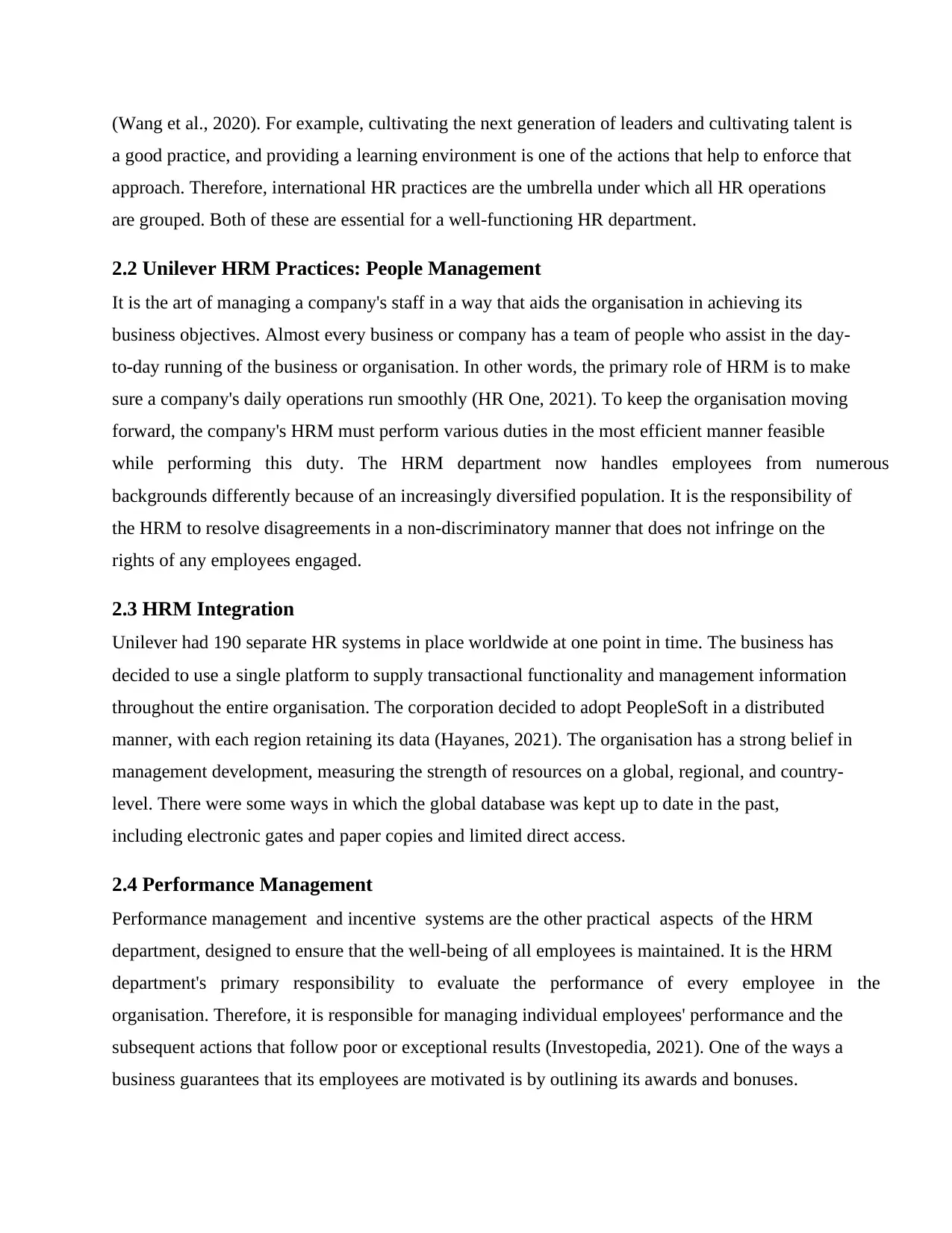
(Wang et al., 2020). For example, cultivating the next generation of leaders and cultivating talent is
a good practice, and providing a learning environment is one of the actions that help to enforce that
approach. Therefore, international HR practices are the umbrella under which all HR operations
are grouped. Both of these are essential for a well-functioning HR department.
2.2 Unilever HRM Practices: People Management
It is the art of managing a company's staff in a way that aids the organisation in achieving its
business objectives. Almost every business or company has a team of people who assist in the day-
to-day running of the business or organisation. In other words, the primary role of HRM is to make
sure a company's daily operations run smoothly (HR One, 2021). To keep the organisation moving
forward, the company's HRM must perform various duties in the most efficient manner feasible
while performing this duty. The HRM department now handles employees from numerous
backgrounds differently because of an increasingly diversified population. It is the responsibility of
the HRM to resolve disagreements in a non-discriminatory manner that does not infringe on the
rights of any employees engaged.
2.3 HRM Integration
Unilever had 190 separate HR systems in place worldwide at one point in time. The business has
decided to use a single platform to supply transactional functionality and management information
throughout the entire organisation. The corporation decided to adopt PeopleSoft in a distributed
manner, with each region retaining its data (Hayanes, 2021). The organisation has a strong belief in
management development, measuring the strength of resources on a global, regional, and country-
level. There were some ways in which the global database was kept up to date in the past,
including electronic gates and paper copies and limited direct access.
2.4 Performance Management
Performance management and incentive systems are the other practical aspects of the HRM
department, designed to ensure that the well-being of all employees is maintained. It is the HRM
department's primary responsibility to evaluate the performance of every employee in the
organisation. Therefore, it is responsible for managing individual employees' performance and the
subsequent actions that follow poor or exceptional results (Investopedia, 2021). One of the ways a
business guarantees that its employees are motivated is by outlining its awards and bonuses.
a good practice, and providing a learning environment is one of the actions that help to enforce that
approach. Therefore, international HR practices are the umbrella under which all HR operations
are grouped. Both of these are essential for a well-functioning HR department.
2.2 Unilever HRM Practices: People Management
It is the art of managing a company's staff in a way that aids the organisation in achieving its
business objectives. Almost every business or company has a team of people who assist in the day-
to-day running of the business or organisation. In other words, the primary role of HRM is to make
sure a company's daily operations run smoothly (HR One, 2021). To keep the organisation moving
forward, the company's HRM must perform various duties in the most efficient manner feasible
while performing this duty. The HRM department now handles employees from numerous
backgrounds differently because of an increasingly diversified population. It is the responsibility of
the HRM to resolve disagreements in a non-discriminatory manner that does not infringe on the
rights of any employees engaged.
2.3 HRM Integration
Unilever had 190 separate HR systems in place worldwide at one point in time. The business has
decided to use a single platform to supply transactional functionality and management information
throughout the entire organisation. The corporation decided to adopt PeopleSoft in a distributed
manner, with each region retaining its data (Hayanes, 2021). The organisation has a strong belief in
management development, measuring the strength of resources on a global, regional, and country-
level. There were some ways in which the global database was kept up to date in the past,
including electronic gates and paper copies and limited direct access.
2.4 Performance Management
Performance management and incentive systems are the other practical aspects of the HRM
department, designed to ensure that the well-being of all employees is maintained. It is the HRM
department's primary responsibility to evaluate the performance of every employee in the
organisation. Therefore, it is responsible for managing individual employees' performance and the
subsequent actions that follow poor or exceptional results (Investopedia, 2021). One of the ways a
business guarantees that its employees are motivated is by outlining its awards and bonuses.
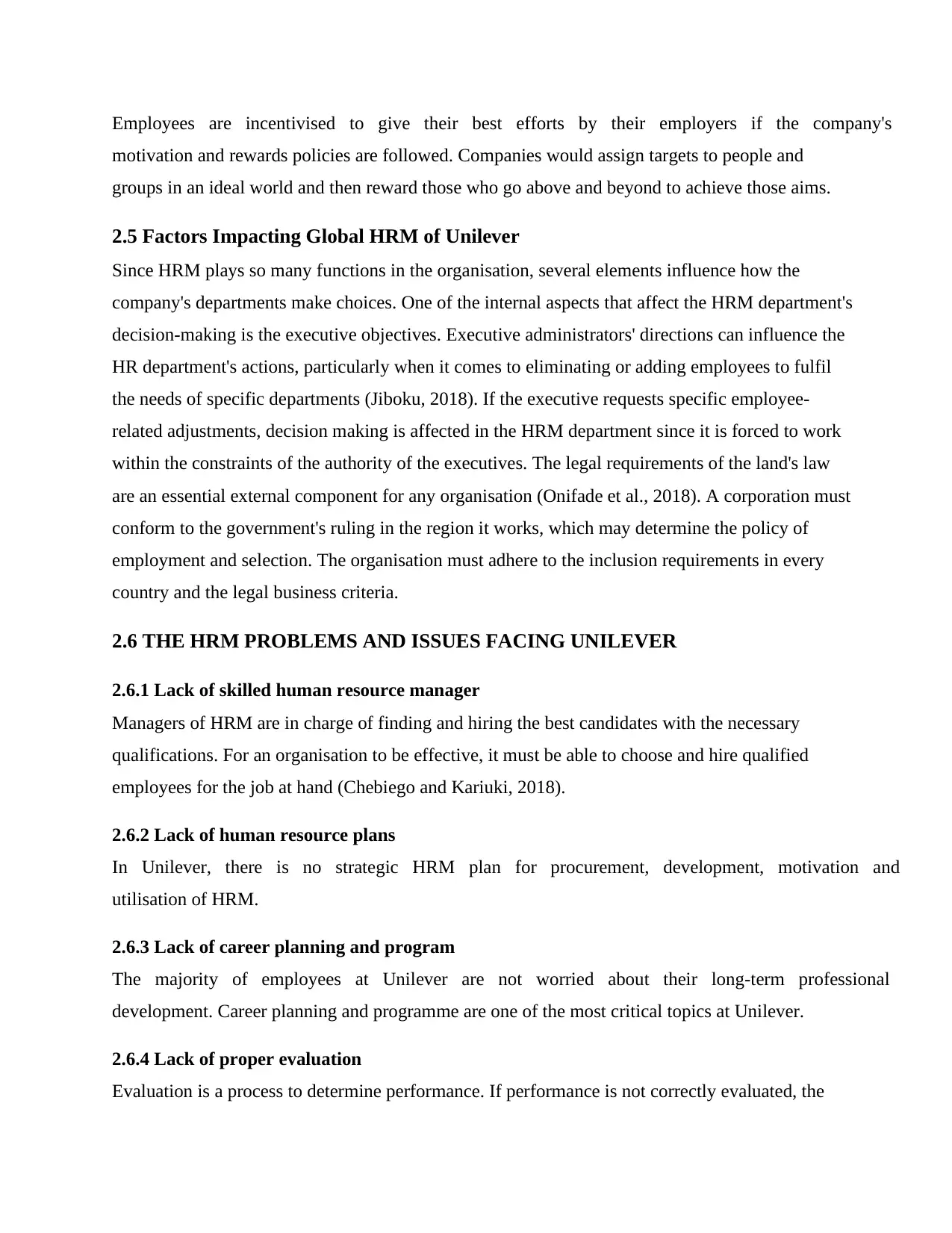
Employees are incentivised to give their best efforts by their employers if the company's
motivation and rewards policies are followed. Companies would assign targets to people and
groups in an ideal world and then reward those who go above and beyond to achieve those aims.
2.5 Factors Impacting Global HRM of Unilever
Since HRM plays so many functions in the organisation, several elements influence how the
company's departments make choices. One of the internal aspects that affect the HRM department's
decision-making is the executive objectives. Executive administrators' directions can influence the
HR department's actions, particularly when it comes to eliminating or adding employees to fulfil
the needs of specific departments (Jiboku, 2018). If the executive requests specific employee-
related adjustments, decision making is affected in the HRM department since it is forced to work
within the constraints of the authority of the executives. The legal requirements of the land's law
are an essential external component for any organisation (Onifade et al., 2018). A corporation must
conform to the government's ruling in the region it works, which may determine the policy of
employment and selection. The organisation must adhere to the inclusion requirements in every
country and the legal business criteria.
2.6 THE HRM PROBLEMS AND ISSUES FACING UNILEVER
2.6.1 Lack of skilled human resource manager
Managers of HRM are in charge of finding and hiring the best candidates with the necessary
qualifications. For an organisation to be effective, it must be able to choose and hire qualified
employees for the job at hand (Chebiego and Kariuki, 2018).
2.6.2 Lack of human resource plans
In Unilever, there is no strategic HRM plan for procurement, development, motivation and
utilisation of HRM.
2.6.3 Lack of career planning and program
The majority of employees at Unilever are not worried about their long-term professional
development. Career planning and programme are one of the most critical topics at Unilever.
2.6.4 Lack of proper evaluation
Evaluation is a process to determine performance. If performance is not correctly evaluated, the
motivation and rewards policies are followed. Companies would assign targets to people and
groups in an ideal world and then reward those who go above and beyond to achieve those aims.
2.5 Factors Impacting Global HRM of Unilever
Since HRM plays so many functions in the organisation, several elements influence how the
company's departments make choices. One of the internal aspects that affect the HRM department's
decision-making is the executive objectives. Executive administrators' directions can influence the
HR department's actions, particularly when it comes to eliminating or adding employees to fulfil
the needs of specific departments (Jiboku, 2018). If the executive requests specific employee-
related adjustments, decision making is affected in the HRM department since it is forced to work
within the constraints of the authority of the executives. The legal requirements of the land's law
are an essential external component for any organisation (Onifade et al., 2018). A corporation must
conform to the government's ruling in the region it works, which may determine the policy of
employment and selection. The organisation must adhere to the inclusion requirements in every
country and the legal business criteria.
2.6 THE HRM PROBLEMS AND ISSUES FACING UNILEVER
2.6.1 Lack of skilled human resource manager
Managers of HRM are in charge of finding and hiring the best candidates with the necessary
qualifications. For an organisation to be effective, it must be able to choose and hire qualified
employees for the job at hand (Chebiego and Kariuki, 2018).
2.6.2 Lack of human resource plans
In Unilever, there is no strategic HRM plan for procurement, development, motivation and
utilisation of HRM.
2.6.3 Lack of career planning and program
The majority of employees at Unilever are not worried about their long-term professional
development. Career planning and programme are one of the most critical topics at Unilever.
2.6.4 Lack of proper evaluation
Evaluation is a process to determine performance. If performance is not correctly evaluated, the
⊘ This is a preview!⊘
Do you want full access?
Subscribe today to unlock all pages.

Trusted by 1+ million students worldwide
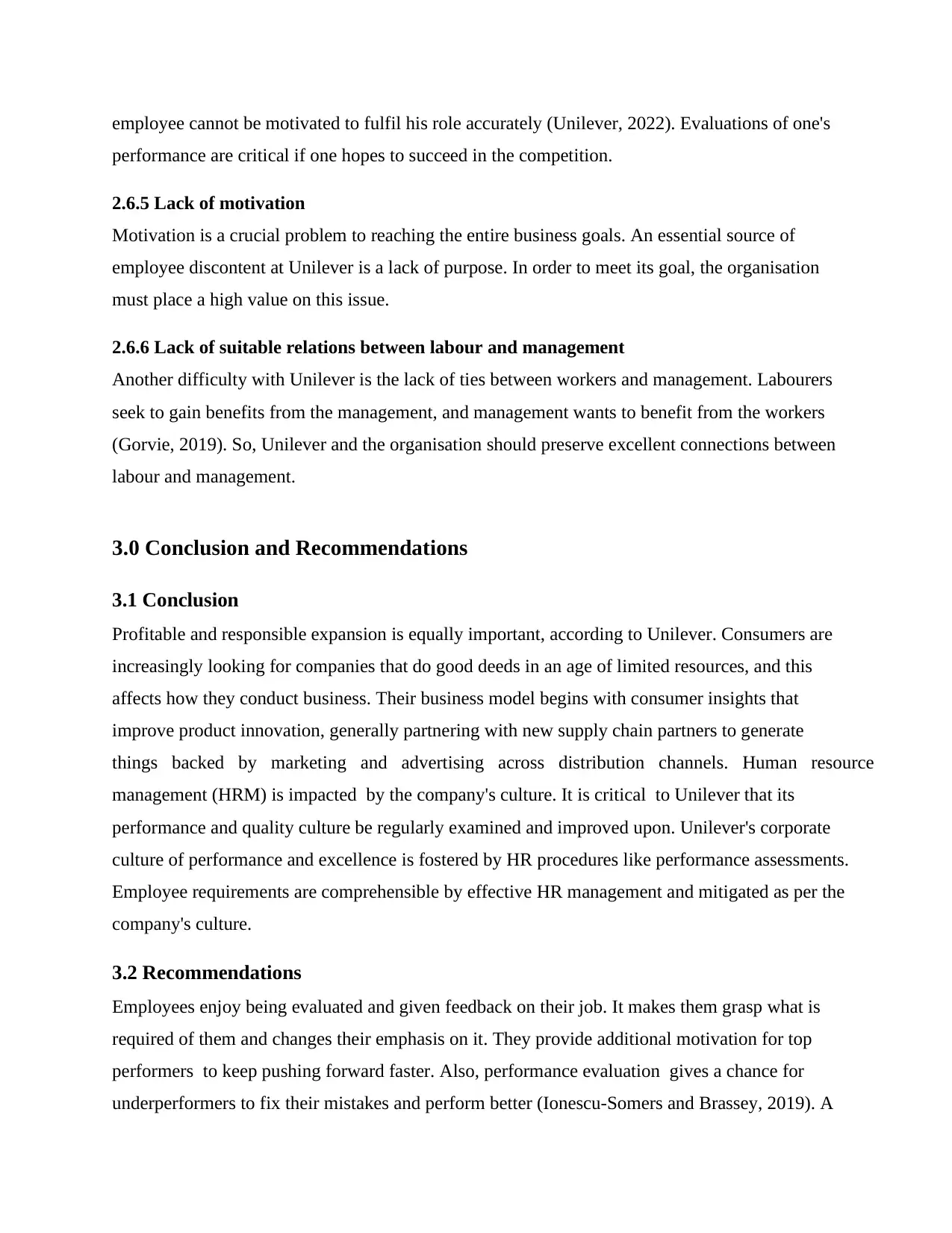
employee cannot be motivated to fulfil his role accurately (Unilever, 2022). Evaluations of one's
performance are critical if one hopes to succeed in the competition.
2.6.5 Lack of motivation
Motivation is a crucial problem to reaching the entire business goals. An essential source of
employee discontent at Unilever is a lack of purpose. In order to meet its goal, the organisation
must place a high value on this issue.
2.6.6 Lack of suitable relations between labour and management
Another difficulty with Unilever is the lack of ties between workers and management. Labourers
seek to gain benefits from the management, and management wants to benefit from the workers
(Gorvie, 2019). So, Unilever and the organisation should preserve excellent connections between
labour and management.
3.0 Conclusion and Recommendations
3.1 Conclusion
Profitable and responsible expansion is equally important, according to Unilever. Consumers are
increasingly looking for companies that do good deeds in an age of limited resources, and this
affects how they conduct business. Their business model begins with consumer insights that
improve product innovation, generally partnering with new supply chain partners to generate
things backed by marketing and advertising across distribution channels. Human resource
management (HRM) is impacted by the company's culture. It is critical to Unilever that its
performance and quality culture be regularly examined and improved upon. Unilever's corporate
culture of performance and excellence is fostered by HR procedures like performance assessments.
Employee requirements are comprehensible by effective HR management and mitigated as per the
company's culture.
3.2 Recommendations
Employees enjoy being evaluated and given feedback on their job. It makes them grasp what is
required of them and changes their emphasis on it. They provide additional motivation for top
performers to keep pushing forward faster. Also, performance evaluation gives a chance for
underperformers to fix their mistakes and perform better (Ionescu-Somers and Brassey, 2019). A
performance are critical if one hopes to succeed in the competition.
2.6.5 Lack of motivation
Motivation is a crucial problem to reaching the entire business goals. An essential source of
employee discontent at Unilever is a lack of purpose. In order to meet its goal, the organisation
must place a high value on this issue.
2.6.6 Lack of suitable relations between labour and management
Another difficulty with Unilever is the lack of ties between workers and management. Labourers
seek to gain benefits from the management, and management wants to benefit from the workers
(Gorvie, 2019). So, Unilever and the organisation should preserve excellent connections between
labour and management.
3.0 Conclusion and Recommendations
3.1 Conclusion
Profitable and responsible expansion is equally important, according to Unilever. Consumers are
increasingly looking for companies that do good deeds in an age of limited resources, and this
affects how they conduct business. Their business model begins with consumer insights that
improve product innovation, generally partnering with new supply chain partners to generate
things backed by marketing and advertising across distribution channels. Human resource
management (HRM) is impacted by the company's culture. It is critical to Unilever that its
performance and quality culture be regularly examined and improved upon. Unilever's corporate
culture of performance and excellence is fostered by HR procedures like performance assessments.
Employee requirements are comprehensible by effective HR management and mitigated as per the
company's culture.
3.2 Recommendations
Employees enjoy being evaluated and given feedback on their job. It makes them grasp what is
required of them and changes their emphasis on it. They provide additional motivation for top
performers to keep pushing forward faster. Also, performance evaluation gives a chance for
underperformers to fix their mistakes and perform better (Ionescu-Somers and Brassey, 2019). A
Paraphrase This Document
Need a fresh take? Get an instant paraphrase of this document with our AI Paraphraser
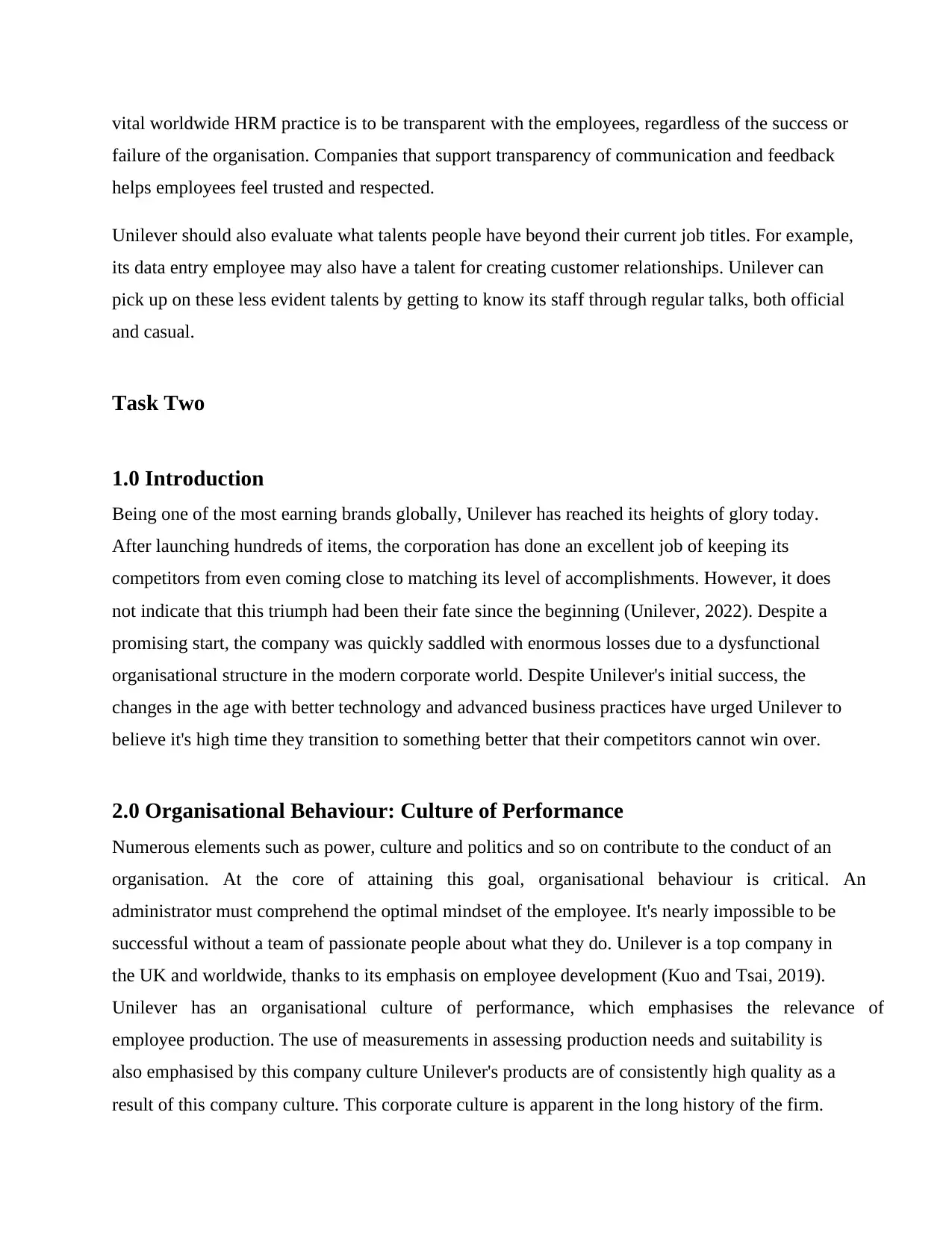
vital worldwide HRM practice is to be transparent with the employees, regardless of the success or
failure of the organisation. Companies that support transparency of communication and feedback
helps employees feel trusted and respected.
Unilever should also evaluate what talents people have beyond their current job titles. For example,
its data entry employee may also have a talent for creating customer relationships. Unilever can
pick up on these less evident talents by getting to know its staff through regular talks, both official
and casual.
Task Two
1.0 Introduction
Being one of the most earning brands globally, Unilever has reached its heights of glory today.
After launching hundreds of items, the corporation has done an excellent job of keeping its
competitors from even coming close to matching its level of accomplishments. However, it does
not indicate that this triumph had been their fate since the beginning (Unilever, 2022). Despite a
promising start, the company was quickly saddled with enormous losses due to a dysfunctional
organisational structure in the modern corporate world. Despite Unilever's initial success, the
changes in the age with better technology and advanced business practices have urged Unilever to
believe it's high time they transition to something better that their competitors cannot win over.
2.0 Organisational Behaviour: Culture of Performance
Numerous elements such as power, culture and politics and so on contribute to the conduct of an
organisation. At the core of attaining this goal, organisational behaviour is critical. An
administrator must comprehend the optimal mindset of the employee. It's nearly impossible to be
successful without a team of passionate people about what they do. Unilever is a top company in
the UK and worldwide, thanks to its emphasis on employee development (Kuo and Tsai, 2019).
Unilever has an organisational culture of performance, which emphasises the relevance of
employee production. The use of measurements in assessing production needs and suitability is
also emphasised by this company culture Unilever's products are of consistently high quality as a
result of this company culture. This corporate culture is apparent in the long history of the firm.
failure of the organisation. Companies that support transparency of communication and feedback
helps employees feel trusted and respected.
Unilever should also evaluate what talents people have beyond their current job titles. For example,
its data entry employee may also have a talent for creating customer relationships. Unilever can
pick up on these less evident talents by getting to know its staff through regular talks, both official
and casual.
Task Two
1.0 Introduction
Being one of the most earning brands globally, Unilever has reached its heights of glory today.
After launching hundreds of items, the corporation has done an excellent job of keeping its
competitors from even coming close to matching its level of accomplishments. However, it does
not indicate that this triumph had been their fate since the beginning (Unilever, 2022). Despite a
promising start, the company was quickly saddled with enormous losses due to a dysfunctional
organisational structure in the modern corporate world. Despite Unilever's initial success, the
changes in the age with better technology and advanced business practices have urged Unilever to
believe it's high time they transition to something better that their competitors cannot win over.
2.0 Organisational Behaviour: Culture of Performance
Numerous elements such as power, culture and politics and so on contribute to the conduct of an
organisation. At the core of attaining this goal, organisational behaviour is critical. An
administrator must comprehend the optimal mindset of the employee. It's nearly impossible to be
successful without a team of passionate people about what they do. Unilever is a top company in
the UK and worldwide, thanks to its emphasis on employee development (Kuo and Tsai, 2019).
Unilever has an organisational culture of performance, which emphasises the relevance of
employee production. The use of measurements in assessing production needs and suitability is
also emphasised by this company culture Unilever's products are of consistently high quality as a
result of this company culture. This corporate culture is apparent in the long history of the firm.
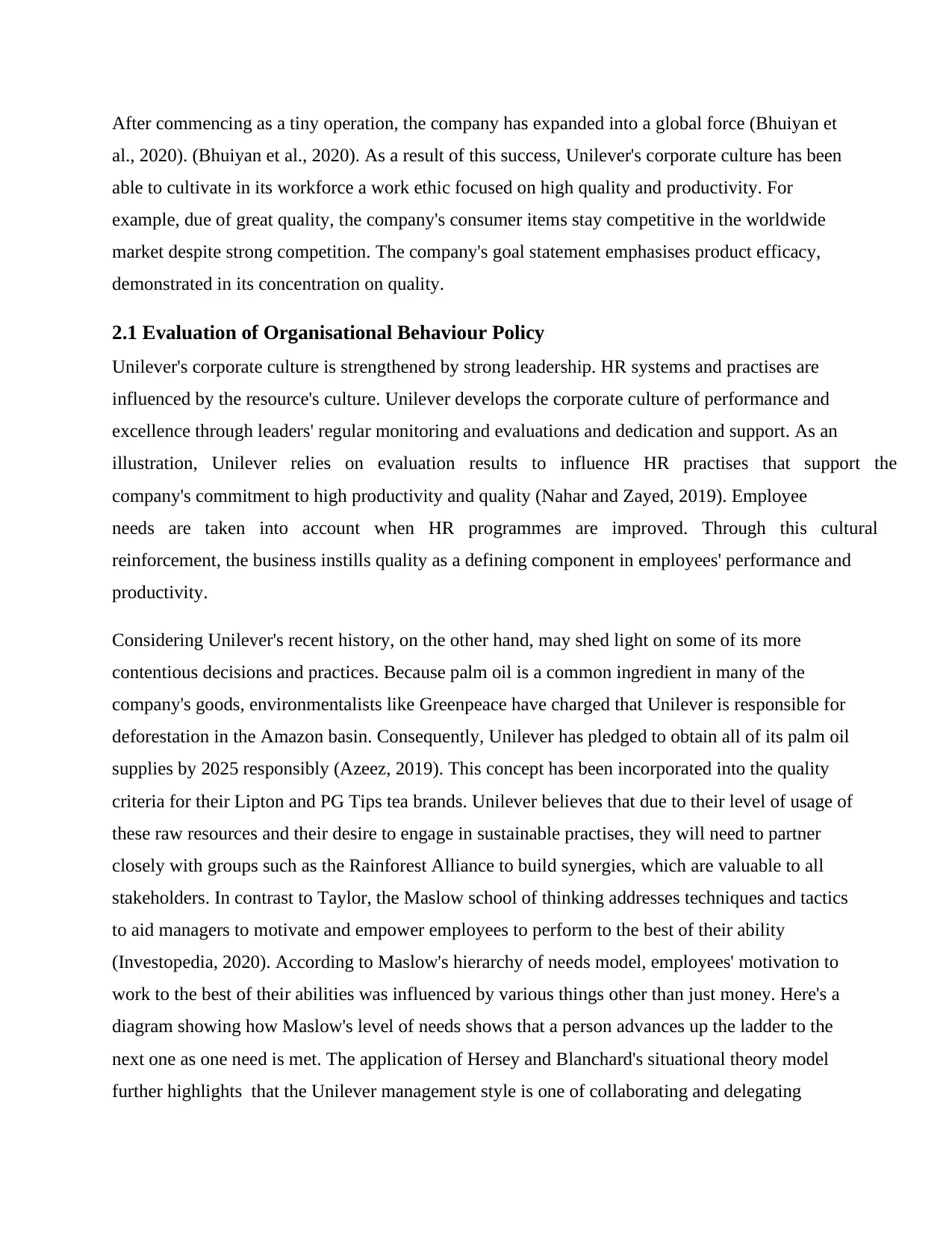
After commencing as a tiny operation, the company has expanded into a global force (Bhuiyan et
al., 2020). (Bhuiyan et al., 2020). As a result of this success, Unilever's corporate culture has been
able to cultivate in its workforce a work ethic focused on high quality and productivity. For
example, due of great quality, the company's consumer items stay competitive in the worldwide
market despite strong competition. The company's goal statement emphasises product efficacy,
demonstrated in its concentration on quality.
2.1 Evaluation of Organisational Behaviour Policy
Unilever's corporate culture is strengthened by strong leadership. HR systems and practises are
influenced by the resource's culture. Unilever develops the corporate culture of performance and
excellence through leaders' regular monitoring and evaluations and dedication and support. As an
illustration, Unilever relies on evaluation results to influence HR practises that support the
company's commitment to high productivity and quality (Nahar and Zayed, 2019). Employee
needs are taken into account when HR programmes are improved. Through this cultural
reinforcement, the business instills quality as a defining component in employees' performance and
productivity.
Considering Unilever's recent history, on the other hand, may shed light on some of its more
contentious decisions and practices. Because palm oil is a common ingredient in many of the
company's goods, environmentalists like Greenpeace have charged that Unilever is responsible for
deforestation in the Amazon basin. Consequently, Unilever has pledged to obtain all of its palm oil
supplies by 2025 responsibly (Azeez, 2019). This concept has been incorporated into the quality
criteria for their Lipton and PG Tips tea brands. Unilever believes that due to their level of usage of
these raw resources and their desire to engage in sustainable practises, they will need to partner
closely with groups such as the Rainforest Alliance to build synergies, which are valuable to all
stakeholders. In contrast to Taylor, the Maslow school of thinking addresses techniques and tactics
to aid managers to motivate and empower employees to perform to the best of their ability
(Investopedia, 2020). According to Maslow's hierarchy of needs model, employees' motivation to
work to the best of their abilities was influenced by various things other than just money. Here's a
diagram showing how Maslow's level of needs shows that a person advances up the ladder to the
next one as one need is met. The application of Hersey and Blanchard's situational theory model
further highlights that the Unilever management style is one of collaborating and delegating
al., 2020). (Bhuiyan et al., 2020). As a result of this success, Unilever's corporate culture has been
able to cultivate in its workforce a work ethic focused on high quality and productivity. For
example, due of great quality, the company's consumer items stay competitive in the worldwide
market despite strong competition. The company's goal statement emphasises product efficacy,
demonstrated in its concentration on quality.
2.1 Evaluation of Organisational Behaviour Policy
Unilever's corporate culture is strengthened by strong leadership. HR systems and practises are
influenced by the resource's culture. Unilever develops the corporate culture of performance and
excellence through leaders' regular monitoring and evaluations and dedication and support. As an
illustration, Unilever relies on evaluation results to influence HR practises that support the
company's commitment to high productivity and quality (Nahar and Zayed, 2019). Employee
needs are taken into account when HR programmes are improved. Through this cultural
reinforcement, the business instills quality as a defining component in employees' performance and
productivity.
Considering Unilever's recent history, on the other hand, may shed light on some of its more
contentious decisions and practices. Because palm oil is a common ingredient in many of the
company's goods, environmentalists like Greenpeace have charged that Unilever is responsible for
deforestation in the Amazon basin. Consequently, Unilever has pledged to obtain all of its palm oil
supplies by 2025 responsibly (Azeez, 2019). This concept has been incorporated into the quality
criteria for their Lipton and PG Tips tea brands. Unilever believes that due to their level of usage of
these raw resources and their desire to engage in sustainable practises, they will need to partner
closely with groups such as the Rainforest Alliance to build synergies, which are valuable to all
stakeholders. In contrast to Taylor, the Maslow school of thinking addresses techniques and tactics
to aid managers to motivate and empower employees to perform to the best of their ability
(Investopedia, 2020). According to Maslow's hierarchy of needs model, employees' motivation to
work to the best of their abilities was influenced by various things other than just money. Here's a
diagram showing how Maslow's level of needs shows that a person advances up the ladder to the
next one as one need is met. The application of Hersey and Blanchard's situational theory model
further highlights that the Unilever management style is one of collaborating and delegating
⊘ This is a preview!⊘
Do you want full access?
Subscribe today to unlock all pages.

Trusted by 1+ million students worldwide
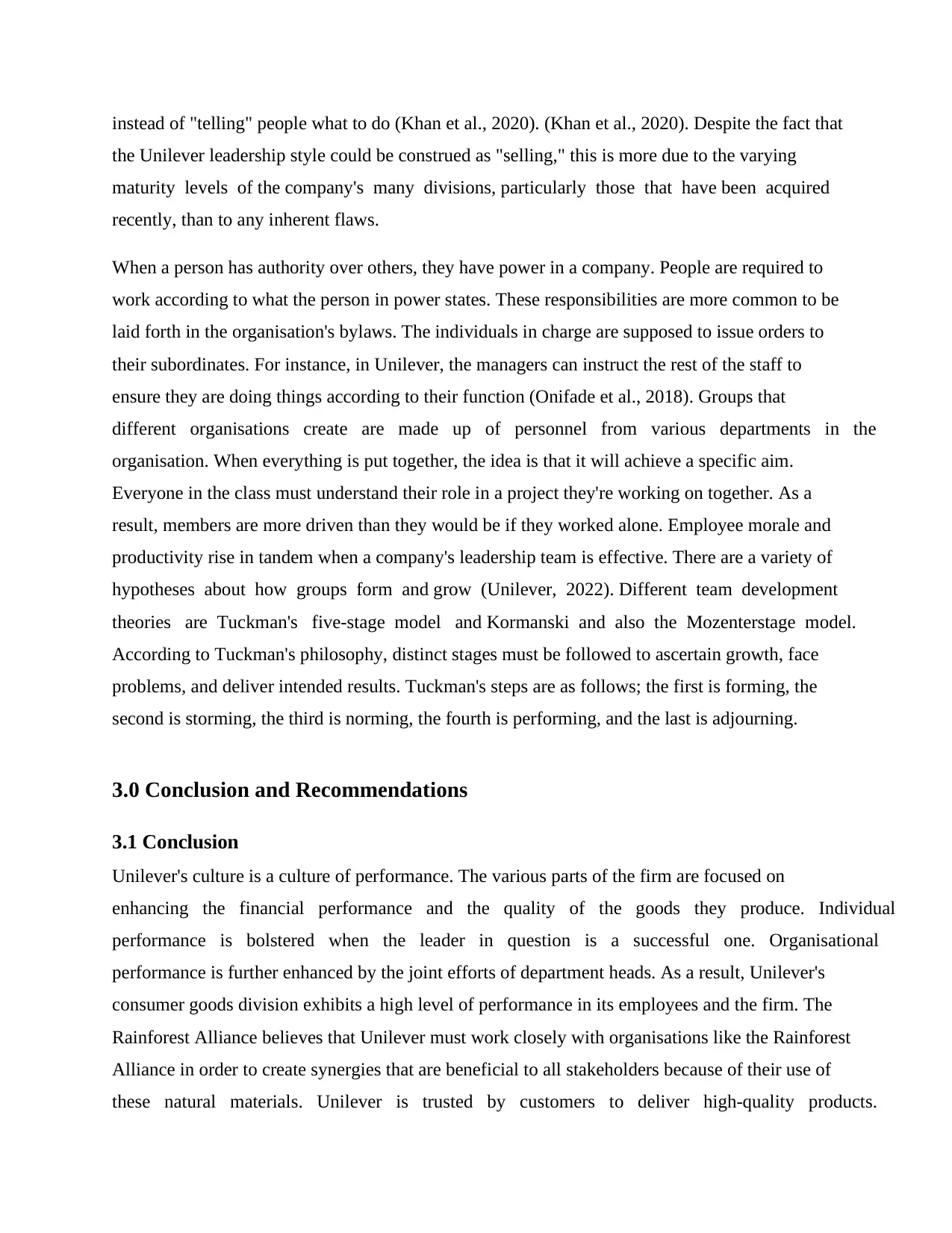
instead of "telling" people what to do (Khan et al., 2020). (Khan et al., 2020). Despite the fact that
the Unilever leadership style could be construed as "selling," this is more due to the varying
maturity levels of the company's many divisions, particularly those that have been acquired
recently, than to any inherent flaws.
When a person has authority over others, they have power in a company. People are required to
work according to what the person in power states. These responsibilities are more common to be
laid forth in the organisation's bylaws. The individuals in charge are supposed to issue orders to
their subordinates. For instance, in Unilever, the managers can instruct the rest of the staff to
ensure they are doing things according to their function (Onifade et al., 2018). Groups that
different organisations create are made up of personnel from various departments in the
organisation. When everything is put together, the idea is that it will achieve a specific aim.
Everyone in the class must understand their role in a project they're working on together. As a
result, members are more driven than they would be if they worked alone. Employee morale and
productivity rise in tandem when a company's leadership team is effective. There are a variety of
hypotheses about how groups form and grow (Unilever, 2022). Different team development
theories are Tuckman's five-stage model and Kormanski and also the Mozenterstage model.
According to Tuckman's philosophy, distinct stages must be followed to ascertain growth, face
problems, and deliver intended results. Tuckman's steps are as follows; the first is forming, the
second is storming, the third is norming, the fourth is performing, and the last is adjourning.
3.0 Conclusion and Recommendations
3.1 Conclusion
Unilever's culture is a culture of performance. The various parts of the firm are focused on
enhancing the financial performance and the quality of the goods they produce. Individual
performance is bolstered when the leader in question is a successful one. Organisational
performance is further enhanced by the joint efforts of department heads. As a result, Unilever's
consumer goods division exhibits a high level of performance in its employees and the firm. The
Rainforest Alliance believes that Unilever must work closely with organisations like the Rainforest
Alliance in order to create synergies that are beneficial to all stakeholders because of their use of
these natural materials. Unilever is trusted by customers to deliver high-quality products.
the Unilever leadership style could be construed as "selling," this is more due to the varying
maturity levels of the company's many divisions, particularly those that have been acquired
recently, than to any inherent flaws.
When a person has authority over others, they have power in a company. People are required to
work according to what the person in power states. These responsibilities are more common to be
laid forth in the organisation's bylaws. The individuals in charge are supposed to issue orders to
their subordinates. For instance, in Unilever, the managers can instruct the rest of the staff to
ensure they are doing things according to their function (Onifade et al., 2018). Groups that
different organisations create are made up of personnel from various departments in the
organisation. When everything is put together, the idea is that it will achieve a specific aim.
Everyone in the class must understand their role in a project they're working on together. As a
result, members are more driven than they would be if they worked alone. Employee morale and
productivity rise in tandem when a company's leadership team is effective. There are a variety of
hypotheses about how groups form and grow (Unilever, 2022). Different team development
theories are Tuckman's five-stage model and Kormanski and also the Mozenterstage model.
According to Tuckman's philosophy, distinct stages must be followed to ascertain growth, face
problems, and deliver intended results. Tuckman's steps are as follows; the first is forming, the
second is storming, the third is norming, the fourth is performing, and the last is adjourning.
3.0 Conclusion and Recommendations
3.1 Conclusion
Unilever's culture is a culture of performance. The various parts of the firm are focused on
enhancing the financial performance and the quality of the goods they produce. Individual
performance is bolstered when the leader in question is a successful one. Organisational
performance is further enhanced by the joint efforts of department heads. As a result, Unilever's
consumer goods division exhibits a high level of performance in its employees and the firm. The
Rainforest Alliance believes that Unilever must work closely with organisations like the Rainforest
Alliance in order to create synergies that are beneficial to all stakeholders because of their use of
these natural materials. Unilever is trusted by customers to deliver high-quality products.
Paraphrase This Document
Need a fresh take? Get an instant paraphrase of this document with our AI Paraphraser
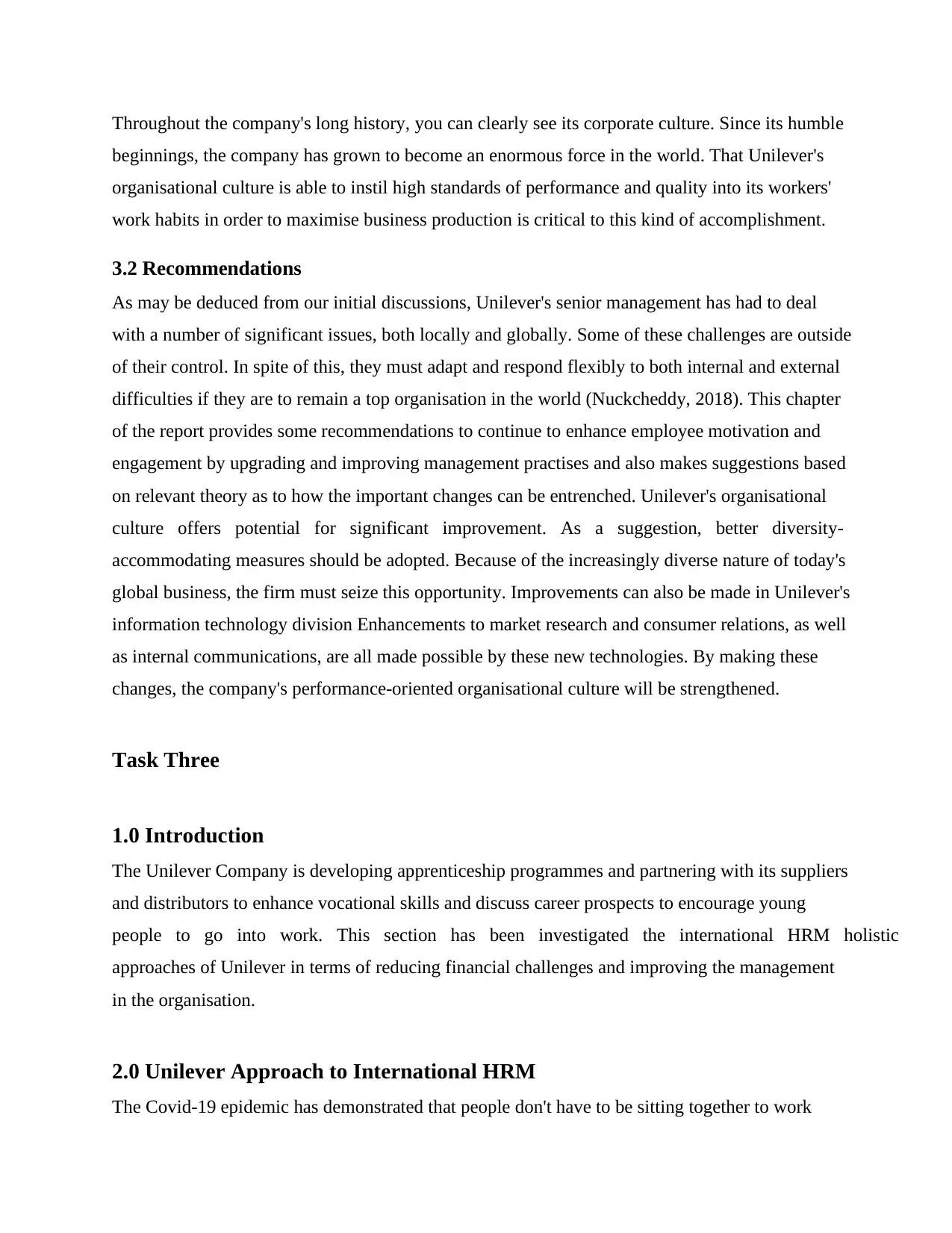
Throughout the company's long history, you can clearly see its corporate culture. Since its humble
beginnings, the company has grown to become an enormous force in the world. That Unilever's
organisational culture is able to instil high standards of performance and quality into its workers'
work habits in order to maximise business production is critical to this kind of accomplishment.
3.2 Recommendations
As may be deduced from our initial discussions, Unilever's senior management has had to deal
with a number of significant issues, both locally and globally. Some of these challenges are outside
of their control. In spite of this, they must adapt and respond flexibly to both internal and external
difficulties if they are to remain a top organisation in the world (Nuckcheddy, 2018). This chapter
of the report provides some recommendations to continue to enhance employee motivation and
engagement by upgrading and improving management practises and also makes suggestions based
on relevant theory as to how the important changes can be entrenched. Unilever's organisational
culture offers potential for significant improvement. As a suggestion, better diversity-
accommodating measures should be adopted. Because of the increasingly diverse nature of today's
global business, the firm must seize this opportunity. Improvements can also be made in Unilever's
information technology division Enhancements to market research and consumer relations, as well
as internal communications, are all made possible by these new technologies. By making these
changes, the company's performance-oriented organisational culture will be strengthened.
Task Three
1.0 Introduction
The Unilever Company is developing apprenticeship programmes and partnering with its suppliers
and distributors to enhance vocational skills and discuss career prospects to encourage young
people to go into work. This section has been investigated the international HRM holistic
approaches of Unilever in terms of reducing financial challenges and improving the management
in the organisation.
2.0 Unilever Approach to International HRM
The Covid-19 epidemic has demonstrated that people don't have to be sitting together to work
beginnings, the company has grown to become an enormous force in the world. That Unilever's
organisational culture is able to instil high standards of performance and quality into its workers'
work habits in order to maximise business production is critical to this kind of accomplishment.
3.2 Recommendations
As may be deduced from our initial discussions, Unilever's senior management has had to deal
with a number of significant issues, both locally and globally. Some of these challenges are outside
of their control. In spite of this, they must adapt and respond flexibly to both internal and external
difficulties if they are to remain a top organisation in the world (Nuckcheddy, 2018). This chapter
of the report provides some recommendations to continue to enhance employee motivation and
engagement by upgrading and improving management practises and also makes suggestions based
on relevant theory as to how the important changes can be entrenched. Unilever's organisational
culture offers potential for significant improvement. As a suggestion, better diversity-
accommodating measures should be adopted. Because of the increasingly diverse nature of today's
global business, the firm must seize this opportunity. Improvements can also be made in Unilever's
information technology division Enhancements to market research and consumer relations, as well
as internal communications, are all made possible by these new technologies. By making these
changes, the company's performance-oriented organisational culture will be strengthened.
Task Three
1.0 Introduction
The Unilever Company is developing apprenticeship programmes and partnering with its suppliers
and distributors to enhance vocational skills and discuss career prospects to encourage young
people to go into work. This section has been investigated the international HRM holistic
approaches of Unilever in terms of reducing financial challenges and improving the management
in the organisation.
2.0 Unilever Approach to International HRM
The Covid-19 epidemic has demonstrated that people don't have to be sitting together to work
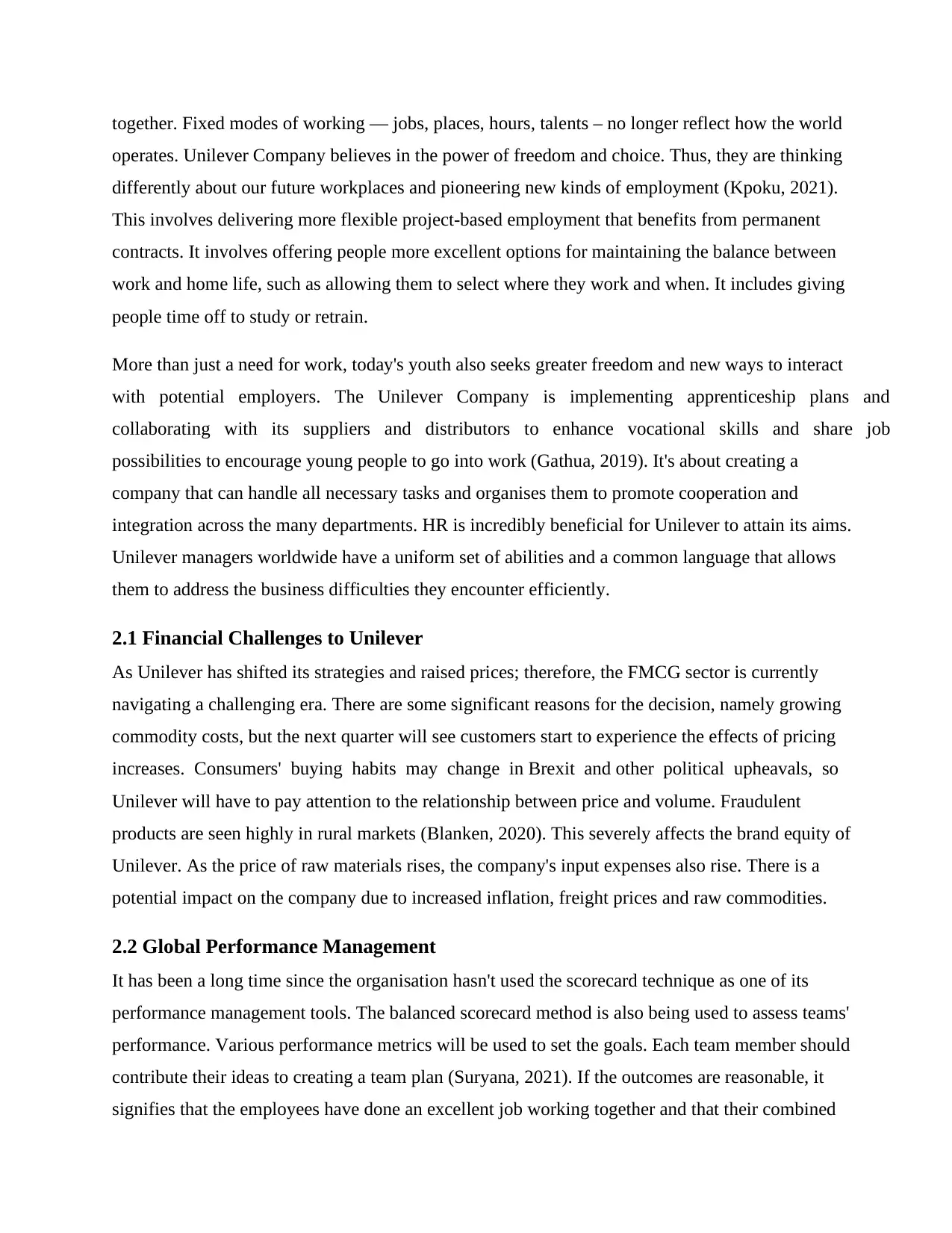
together. Fixed modes of working — jobs, places, hours, talents – no longer reflect how the world
operates. Unilever Company believes in the power of freedom and choice. Thus, they are thinking
differently about our future workplaces and pioneering new kinds of employment (Kpoku, 2021).
This involves delivering more flexible project-based employment that benefits from permanent
contracts. It involves offering people more excellent options for maintaining the balance between
work and home life, such as allowing them to select where they work and when. It includes giving
people time off to study or retrain.
More than just a need for work, today's youth also seeks greater freedom and new ways to interact
with potential employers. The Unilever Company is implementing apprenticeship plans and
collaborating with its suppliers and distributors to enhance vocational skills and share job
possibilities to encourage young people to go into work (Gathua, 2019). It's about creating a
company that can handle all necessary tasks and organises them to promote cooperation and
integration across the many departments. HR is incredibly beneficial for Unilever to attain its aims.
Unilever managers worldwide have a uniform set of abilities and a common language that allows
them to address the business difficulties they encounter efficiently.
2.1 Financial Challenges to Unilever
As Unilever has shifted its strategies and raised prices; therefore, the FMCG sector is currently
navigating a challenging era. There are some significant reasons for the decision, namely growing
commodity costs, but the next quarter will see customers start to experience the effects of pricing
increases. Consumers' buying habits may change in Brexit and other political upheavals, so
Unilever will have to pay attention to the relationship between price and volume. Fraudulent
products are seen highly in rural markets (Blanken, 2020). This severely affects the brand equity of
Unilever. As the price of raw materials rises, the company's input expenses also rise. There is a
potential impact on the company due to increased inflation, freight prices and raw commodities.
2.2 Global Performance Management
It has been a long time since the organisation hasn't used the scorecard technique as one of its
performance management tools. The balanced scorecard method is also being used to assess teams'
performance. Various performance metrics will be used to set the goals. Each team member should
contribute their ideas to creating a team plan (Suryana, 2021). If the outcomes are reasonable, it
signifies that the employees have done an excellent job working together and that their combined
operates. Unilever Company believes in the power of freedom and choice. Thus, they are thinking
differently about our future workplaces and pioneering new kinds of employment (Kpoku, 2021).
This involves delivering more flexible project-based employment that benefits from permanent
contracts. It involves offering people more excellent options for maintaining the balance between
work and home life, such as allowing them to select where they work and when. It includes giving
people time off to study or retrain.
More than just a need for work, today's youth also seeks greater freedom and new ways to interact
with potential employers. The Unilever Company is implementing apprenticeship plans and
collaborating with its suppliers and distributors to enhance vocational skills and share job
possibilities to encourage young people to go into work (Gathua, 2019). It's about creating a
company that can handle all necessary tasks and organises them to promote cooperation and
integration across the many departments. HR is incredibly beneficial for Unilever to attain its aims.
Unilever managers worldwide have a uniform set of abilities and a common language that allows
them to address the business difficulties they encounter efficiently.
2.1 Financial Challenges to Unilever
As Unilever has shifted its strategies and raised prices; therefore, the FMCG sector is currently
navigating a challenging era. There are some significant reasons for the decision, namely growing
commodity costs, but the next quarter will see customers start to experience the effects of pricing
increases. Consumers' buying habits may change in Brexit and other political upheavals, so
Unilever will have to pay attention to the relationship between price and volume. Fraudulent
products are seen highly in rural markets (Blanken, 2020). This severely affects the brand equity of
Unilever. As the price of raw materials rises, the company's input expenses also rise. There is a
potential impact on the company due to increased inflation, freight prices and raw commodities.
2.2 Global Performance Management
It has been a long time since the organisation hasn't used the scorecard technique as one of its
performance management tools. The balanced scorecard method is also being used to assess teams'
performance. Various performance metrics will be used to set the goals. Each team member should
contribute their ideas to creating a team plan (Suryana, 2021). If the outcomes are reasonable, it
signifies that the employees have done an excellent job working together and that their combined
⊘ This is a preview!⊘
Do you want full access?
Subscribe today to unlock all pages.

Trusted by 1+ million students worldwide
1 out of 19
Related Documents
Your All-in-One AI-Powered Toolkit for Academic Success.
+13062052269
info@desklib.com
Available 24*7 on WhatsApp / Email
![[object Object]](/_next/static/media/star-bottom.7253800d.svg)
Unlock your academic potential
Copyright © 2020–2026 A2Z Services. All Rights Reserved. Developed and managed by ZUCOL.




